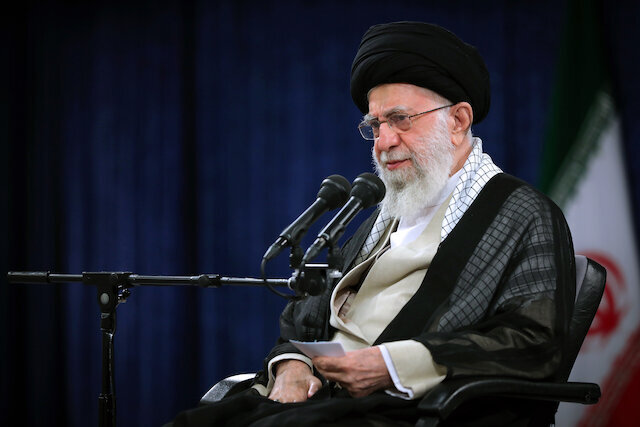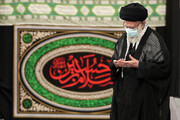In reviewing the situation in 1981 and the months leading up to June 28th of that year, Imam Khamenei spoke about the difficult situation that existed at that time due to the Imposed War and the advance of Saddam's forces to the close vicinity of several large cities in the west and in the south. He explained, “In addition to the very unfavorable situation due to the war, the Munafiqin had for all practical purposes started a civil war in Tehran. And the political situation was such that just a few days before June 28th, the Parliament had declared the political incompetence of the President based on their vote. So the country did not have a President. In such circumstances, a pillar like Martyr Beheshti was taken from the Revolution and the system."
In this regard, the Leader also referred to the martyrdom of the President and Prime Minister of the country, which took place two months after the 7th of Tir Tragedy (June 28), and also the martyrdom of a number of senior Army Commanders in a plane crash after that. He stressed the fact that, "The youth and the new generation are not aware of these events. They need to study these issues and think about them carefully. Which government and country do you know of that does not collapse due to such bitter, dire events?”
The Leader of the Islamic Revolution stated, “In the face of all these events, Imam (Khomeini) stood firmly like Mount Damavand at the head. And the caring officials, the people and the revolutionary youth also stood up and were able to turn the situation of the country around one hundred and eighty degrees. This change was to such an extent that successive failures turned into a series of victories. The Munafiqin (MEK) were cleared from the streets, the Army and the Guard Corps became stronger, and the country returned to normal."
Imam Khamenei referred to the excitement of the enemy at times due to some weaknesses and internal shortcomings in the country. He added, "Both in the year 1981 and after that over the last four decades, the enemy has become excited and hopeful. They imagined the Revolution and the system were falling apart. But this hope of theirs has turned into frustration. Their problem is that they do not understand the secret behind their being frustrated." In analyzing this point, Imam Khamenei stated, "The enemy cannot understand that in this world, apart from political calculations, there are other calculations as well. These are the divine traditions."
The Leader referred to examples of divine traditions and laws in the Holy Qur'an with regard to the result of helping the religion of God and the outcome of not being thankful for God’s blessings, and he added, "The Holy Qur'an is full of themes that are related to the divine traditions. The conclusion that may be made from these is that if societies stand up to the enemies and carry out their duties while relying on God, the result is victory and progress. But if differences arise, people only pursue their own welfare and they show weakness, the result will be defeat." Emphasizing the need for a serious, scientific study of the divine traditions from a sociological point of view, Imam Khamenei summed up his speech on this topic as follows, “In the year 1981, the Iranian nation was able to frustrate the enemy by sticking to one of the divine traditions, namely jihad and resistance. Today, the same rule and law is in force, and God in the year 2022 is the same God He was in 1981. We must apply ourselves to be an example of the divine traditions so that the outcome will be progress and victory."
The Leader of the Islamic Revolution went on to say that the Judiciary Branch is an important, influential pillar throughout the country. He explained this as follows, “According to the verses of the Holy Qur’an, the duty of the Islamic government is to establish prayers. This means spreading a spirit of servitude in the Islamic Republic. Giving the zakat [Islamic poor tax] means establishing justice in the Islamic society. Enjoining good and forbidding evil means inviting people to values such as justice, fairness, brotherhood and forbidding oppression, corruption and discrimination. These have been emphasized in the Constitution and are a part of the duties of the Judiciary Branch. If these duties are not carried out using various facilities such as the facilities of the Judiciary and the court system, this is an example of wasting the divine blessings and will be a blow to ourselves."
Imam Khamenei said that the Head of the Judiciary Branch is a believer, revolutionary, hardworking, with the people, does not stand on ceremony, is familiar with the various aspects of the Judiciary, and is someone who listens to critics.” The Leader also made eight fundamental recommendations to the officials and staff of the Judiciary Branch.
In his first recommendation, Imam Khamenei considered the Document on Fundamental Transformation, which was prepared during the period of the previous management, to be one of the most progressive documents for change. He emphasized, “This document should be acted upon, and a workforce and personnel should be created based on it.”
"Seriously fighting corruption" was Imam Khamenei's next recommendation to the officials of the Judiciary. He confirmed the words of the Head of the Judiciary that "fighting corruption within
the judiciary is a priority." He also stressed that, “The majority of judges are honorable, honest, decent, faithful and hardworking. But the few corrupt people who damage the work and reputation of others should be confronted. Of course, in the fight against corruption, the main task is to confront the foundations that bring corruption and to eliminate those.
In his next recommendation, he declared that the honorable, hard-working judges and staff should be encouraged.
Another of Imam Khamenei's recommendations to the officials in the Judiciary was "not to suspend any of the powers or legal duties of the Judiciary."
He cited crime prevention as being another example of the important duties of the Judiciary Branch and said, "For example, crimes such as land-grabbing and taking possession of parts of the mountains should be prevented by acting in accordance with the laws to determine land ownership in cities and villages."
In his sixth recommendation, the Leader of the Revolution emphasized "regulating the relations between the Judiciary and executive officers in the Judiciary." He explained, “The behavior of the officers should be monitored and supervised so that their behavior with the accused is not exaggerated or extremist. The Judiciary should not be under the influence of the officers. Rather, it should deal with issues independently. Of course, the expert opinions of the officers should not be ignored.”
In his next recommendation, Imam Khamenei referred to the responsibility of the Judiciary for the psychological security of the people. He stressed this point that, "Psychological security is one of the rights of the people. The Judiciary Branch must prevent the minds of the people from becoming worried and disturbed due to rumors, false claims and the frightening statements of specific or unknown individuals in both the media and the internet.”
In his eighth and final recommendation, the Leader of the Revolution spoke about opening various important cases in front of the public opinion, such as matters related to factories or illegal seizures. He emphasized, “The wounds that are created by cases that are opened in front of the public opinion should not be left open. Continue each file to the end and finalize it.”
At the end of his speech, he said that the work of the Judiciary is one of the most difficult tasks. He stated, “Of course, if you do this work for God and with divine guidance, it will bring abundant reward too.”
At the beginning of the meeting, Hujjat al-Islam wal-Muslimeen Mohseni-Ejei, Head of the Judiciary, presented a report on the performance of the Judiciary during this recent period. He emphasized more communication with different segments of the people, strengthening interactions with the other executive branches, striving to carry out the Document on Fundamental Transformation in the Judiciary, working to greatly increase the use of new technologies and artificial intelligence in judicial services, supporting production and removing barriers to it, making some judicial services free in deprived areas, seriously fighting corruption especially within the Judiciary itself, prioritizing cases that have many plaintiffs and which are important in the public opinion, and intensified monitoring of the correct execution of laws and regulations that are to be carried out, as well as continuous, ongoing follow-ups to improve the living conditions of employees and strengthening the budget base of the judiciary.




Your Comment